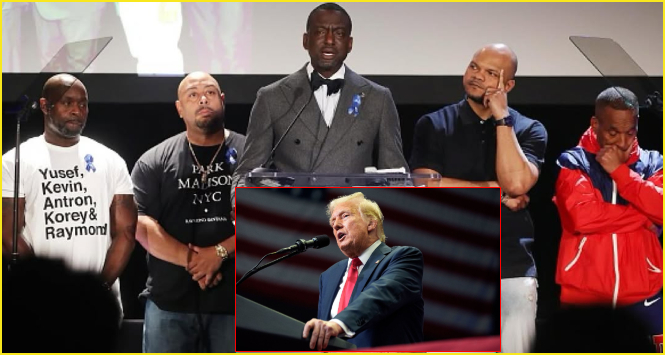A federal judge in Philadelphia has denied President Donald J. Trump’s motion to dismiss a defamation lawsuit brought against him by the five men wrongly convicted in the notorious 1989 Central Park jogger case.
U.S. District Judge Wendy Beetlestone ruled that the lawsuit filed by Yusef Salaam, Antron McCray, Kevin Richardson, Raymond Santana, and Korey Wise—collectively known as the Central Park Five—can proceed to discovery.
The ruling marks a pivotal moment in the men’s efforts to hold Trump accountable for public comments he made during a nationally televised debate in September 2020.
Defamation Allegations
The lawsuit stems from Trump’s remarks during the September 10, 2020 presidential debate in Philadelphia with then-Vice President Kamala Harris.
Responding to Harris’s mention of the case, Trump made several inaccurate and inflammatory statements, including claiming the men had confessed to the crime and pleaded guilty.
“They admitted, they said, they pled guilty,” Trump stated at the time. “And I said, ‘Well, if they pled guilty, they badly hurt a person, killed a person ultimately. And if they pled guilty — then they pled we’re not guilty.’”
The plaintiffs argue these statements were not only false but also defamatory, given that they never pled guilty, no one was killed in the attack, and their convictions were ultimately vacated after another man confessed and DNA evidence confirmed his guilt.
All five were exonerated in 2002 after spending between six and 13 years behind bars.
Court Ruling
Judge Beetlestone rejected Trump’s attempt to dismiss the defamation claims outright, allowing the lawsuit to move forward toward trial.
Attorney Shanin Specter, who represents the five men, issued a statement following the ruling:
“We are gratified by the Court’s ruling and thorough analysis and look forward to discovery, trial, and the ultimate vindication of these five fine men.”
Legal and Historical Significance
The Central Park Five case has long symbolized racial injustice and the dangers of wrongful convictions. Trump, who at the time of their prosecution took out full-page newspaper ads calling for the reinstatement of the death penalty in New York, has never retracted his past remarks about the case—even after the men’s exoneration.
Legal observers are closely watching this case as it tests the boundaries of defamation law involving public figures and long-standing reputational harm.
The ruling affirms that public officials, including former presidents, may still be held accountable for knowingly false and damaging statements.

